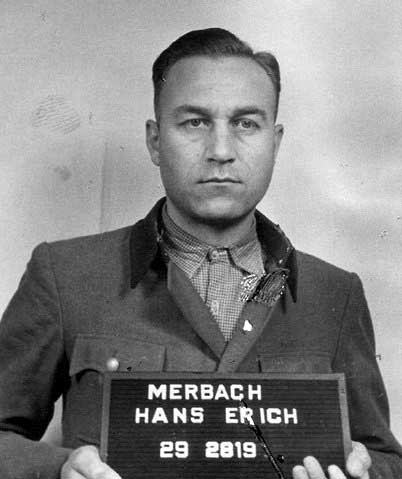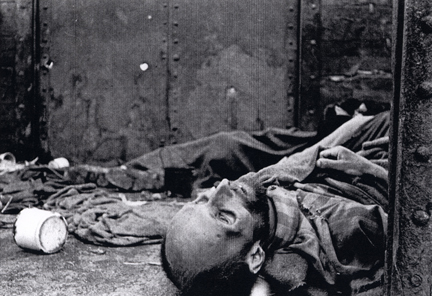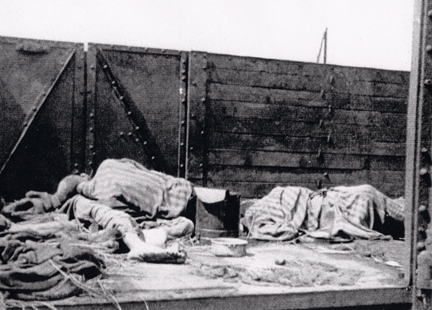Dachau Trials
US vs. Josias Erbprinz zu Waldeck-Pyrmont
The Trial of Hans Merbach

Hans Erich Merbach
One of the most horrific war crimes committed
by the 31 Buchenwald war criminals was perpetrated by Hans Merbach,
who was the 35-year-old SS man assigned to supervise the evacuation
of Buchenwald prisoners to Dachau to prevent them from being
released by the American liberators. The train had left the Weimar
station near Buchenwald on April 8, 1945 and didn't arrive at
Dachau until almost three weeks later. By that time, many of
the prisoners were dead.

Dead prisoner on train
from Buchenwald that was delayed for 3 weeks
One of the Jewish prisoners who survived
the evacuation transport from Buchenwald to Dachau was Martin
Rosenfeld, who testified for the prosecution at the proceedings
against the Buchenwald staff members by an American Military
Tribunal held at Dachau, which began on April 11, 1947. On the
witness stand, Rosenfeld claimed that 350 of the Buchenwald prisoners
were shot as they walked the 5 miles from the concentration camp
down to the train station at Weimar; he testified that he personally
saw Merbach shoot ten of the prisoners.
Rosenfeld also testified that Merbach
used a Machine Pistol to kill civilians in the Czechoslovakian
town of Pilsen because they had heard about the train on the
radio and had brought food for the prisoners when the train stopped.
He claimed that when the train made another stop along the way,
Merbach went from one boxcar to another, shooting the prisoners,
including 20 in the boxcar that Rosenfeld was riding in.
According to Rosenfeld, Merbach ordered
all of the French prisoners out of the boxcars and then mercilessly
gunned them down. The remaining prisoners were forced to bury
the bodies and those who were too weak for the task were shot.
The train was strafed by Allied planes
on the way and the prisoners were forced to stay in the open
boxcars, while the SS men took cover in the woods, according
to Rosenfeld's testimony, as quoted by Joshua M. Greene in his
book "Justice at Dachau." Other survivors of the Death
Train testified that Merbach had shot dying prisoners and
prisoners who had been wounded by American bullets.
During direct examination by his defense
attorney, Merbach testified that there were already dead bodies
lying beside the road from Buchenwald to Weimar before the prisoners
were marched to the train station on April 7, 1945. These prisoners
had died on an earlier evacuation march out of Buchenwald to
the Flossenbürg camp, or on the April 2nd evacuation march
from the Ohrdruf
sub-camp to the main camp at Buchenwald.
Merbach claimed that he had gone out
of his way to get additional food for the prisoners after he
realized that the train would be delayed because the tracks had
been bombed by Allied planes. He said that when he tried to get
more food, he was told that there was "barely any bread
left" at Buchenwald.
When the train stopped at Dresden, the
captain of the police there told Merbach that "it was impossible
to get a piece of bread because the city was overrun with refugees."
The refugees were German women and children who were trying to
escape from the advancing Russian soldiers. Dresden had been
fire bombed by American and British planes, only 8 week before,
and thousands of civilians had been killed.
Merbach testified that at every stop,
he sent four prisoners to the National Socialist Welfare Association
to get buckets of water for the other prisoners. The photo below
shows one of the box cars with a bucket in it.

Prisoners on death
train were given buckets of water on the way
In his defense, Merbach testified that
the citizens of Pilsen in Czechoslovakia had not brought food
to the train and he cast doubt on Rosenfeld's claim that the
residents had heard about the train's arrival from a Czech radio
station. The next stop was Namering, a town in Upper Bavaria.
There the prisoners did receive rations from the people in the
town, according to Merbach. This was confirmed by the mayor of
Namering.
Merbach said that some of the prisoners
had escaped from the train, which sounds plausible since they
were riding in open boxcars. Merbach's crime was that he was
part of the "common plan" to kill the Buchenwald prisoners
because he had prevented the escape of most of the prisoners
from the train. Merbach said that he could not release the prisoners
because "every time a prisoner escaped the most incredible
things were happening among the civilian population."
The purpose of evacuating these prisoners
had been to keep them from being released by American troops
who were nearing Buchenwald. After Buchenwald was liberated,
the Americans did release some of the prisoners and provided
them with guns and American jeeps. The prisoners went down to
Weimar where they engaged in an orgy of raping, looting and killing
innocent German civilians.
Due to the Allied bombing of the German
railroad tracks, the trip to Dachau took almost three weeks instead
of the originally estimated 24 hours to travel 220 miles from
Buchenwald to Dachau.
In the proceedings of the American Military
Tribunals at Dachau, the accused were considered guilty until
proven innocent. Their guilt had already been established by
interrogations beforehand.
The interrogation of Hans Merbach took
place at Freising on July 11, 1945 at which time Merbach testified
that "Officers were beaten with a piece of cable in the
face. And that, I suppose, is why the most incredible stories
came out, particularly concerning this transport."
When Merbach was asked by the prosecuting
attorney if he wanted to change his sworn statement, made in
Freising when his memory was fresher, Merbach addressed the tribunal
directly with the following statement, as quoted by Joshau M.
Greene in his book "Justice at Dachau":
Yes, my memory in Freising was better,
but the methods of interrogation caused me to say crazy things.
Among the accused here are other officers who were beaten at
that time. May it please the court, I was raised by decent parents.
In 1917, when I was only seven, my mother got sick and a Jewish
physician named Falkenstein treated her every day. I was very
much grateful to him, although I knew he was Jewish. Even during
my maneuvers with the Wehrmacht in 1936 and 1937 I didn't make
any difference between Aryans and half-Jewish soldiers. I hated
to participate in this fight of the government against religion.
For me existed only one thing, love of my country and my people.
It was not in me to participate in cruelties against unarmed
people, to mistreat them or kill them. I am horrified about the
accusations that are made here in court against me. About the
transport, I have told you everything I know. I am imprisoned
now for the past two years, and every day I search myself and
weigh the good and the bad. I got food for prisoners, helped
wherever I could and had deepest feelings for these poor people.
If you members of the high court find me criminal in this transport,
I have confidence you will at least not put me on the level of
men who had bad intentions. Judge me as a man who tried to do
his best. I had to obey crazy orders. Until the end I always
tried the best. I await your judgment.
On August 14, 1947, Hans Merbach was
convicted by the Tribunal at Dachau and sentenced to death. He
was the last of the war criminals in the main Buchenwald trial
to be hanged; the date of his execution was January 14, 1949.
Not to have convicted Hans Merbach would
have been a great miscarriage of justice since he was indirectly
responsible for the massacre of Waffen-SS soldiers who had surrendered
at Dachau. The American liberators justified the killing of unarmed
POWs by claiming that they had been enraged by the sight the
dead bodies on the Death Train.
Sentences
of the guilty
Commandant
Hermann Pister
Execution
of Communist Commissars
Ilse
Koch - human lampshades
Dr.
Hans Eisele
Back
to Buchenwald Trial
Back to Dachau
Trials
Home
This page was last updated on September
16, 2009
Dachau TrialsUS vs. Josias Erbprinz zu Waldeck-PyrmontThe Trial of Hans Merbach One of the most horrific war crimes committed by the 31 Buchenwald war criminals was perpetrated by Hans Merbach, who was the 35-year-old SS man assigned to supervise the evacuation of Buchenwald prisoners to Dachau to prevent them from being released by the American liberators. The train had left the Weimar station near Buchenwald on April 8, 1945 and didn't arrive at Dachau until almost three weeks later. By that time, many of the prisoners were dead.  One of the Jewish prisoners who survived the evacuation transport from Buchenwald to Dachau was Martin Rosenfeld, who testified for the prosecution at the proceedings against the Buchenwald staff members by an American Military Tribunal held at Dachau, which began on April 11, 1947. On the witness stand, Rosenfeld claimed that 350 of the Buchenwald prisoners were shot as they walked the 5 miles from the concentration camp down to the train station at Weimar; he testified that he personally saw Merbach shoot ten of the prisoners. Rosenfeld also testified that Merbach used a Machine Pistol to kill civilians in the Czechoslovakian town of Pilsen because they had heard about the train on the radio and had brought food for the prisoners when the train stopped. He claimed that when the train made another stop along the way, Merbach went from one boxcar to another, shooting the prisoners, including 20 in the boxcar that Rosenfeld was riding in. According to Rosenfeld, Merbach ordered all of the French prisoners out of the boxcars and then mercilessly gunned them down. The remaining prisoners were forced to bury the bodies and those who were too weak for the task were shot. The train was strafed by Allied planes on the way and the prisoners were forced to stay in the open boxcars, while the SS men took cover in the woods, according to Rosenfeld's testimony, as quoted by Joshua M. Greene in his book "Justice at Dachau." Other survivors of the Death Train testified that Merbach had shot dying prisoners and prisoners who had been wounded by American bullets. During direct examination by his defense attorney, Merbach testified that there were already dead bodies lying beside the road from Buchenwald to Weimar before the prisoners were marched to the train station on April 7, 1945. These prisoners had died on an earlier evacuation march out of Buchenwald to the Flossenbürg camp, or on the April 2nd evacuation march from the Ohrdruf sub-camp to the main camp at Buchenwald. Merbach claimed that he had gone out of his way to get additional food for the prisoners after he realized that the train would be delayed because the tracks had been bombed by Allied planes. He said that when he tried to get more food, he was told that there was "barely any bread left" at Buchenwald. When the train stopped at Dresden, the captain of the police there told Merbach that "it was impossible to get a piece of bread because the city was overrun with refugees." The refugees were German women and children who were trying to escape from the advancing Russian soldiers. Dresden had been fire bombed by American and British planes, only 8 week before, and thousands of civilians had been killed. Merbach testified that at every stop, he sent four prisoners to the National Socialist Welfare Association to get buckets of water for the other prisoners. The photo below shows one of the box cars with a bucket in it.  In his defense, Merbach testified that the citizens of Pilsen in Czechoslovakia had not brought food to the train and he cast doubt on Rosenfeld's claim that the residents had heard about the train's arrival from a Czech radio station. The next stop was Namering, a town in Upper Bavaria. There the prisoners did receive rations from the people in the town, according to Merbach. This was confirmed by the mayor of Namering. Merbach said that some of the prisoners had escaped from the train, which sounds plausible since they were riding in open boxcars. Merbach's crime was that he was part of the "common plan" to kill the Buchenwald prisoners because he had prevented the escape of most of the prisoners from the train. Merbach said that he could not release the prisoners because "every time a prisoner escaped the most incredible things were happening among the civilian population." The purpose of evacuating these prisoners had been to keep them from being released by American troops who were nearing Buchenwald. After Buchenwald was liberated, the Americans did release some of the prisoners and provided them with guns and American jeeps. The prisoners went down to Weimar where they engaged in an orgy of raping, looting and killing innocent German civilians. Due to the Allied bombing of the German railroad tracks, the trip to Dachau took almost three weeks instead of the originally estimated 24 hours to travel 220 miles from Buchenwald to Dachau. In the proceedings of the American Military Tribunals at Dachau, the accused were considered guilty until proven innocent. Their guilt had already been established by interrogations beforehand. The interrogation of Hans Merbach took place at Freising on July 11, 1945 at which time Merbach testified that "Officers were beaten with a piece of cable in the face. And that, I suppose, is why the most incredible stories came out, particularly concerning this transport." When Merbach was asked by the prosecuting attorney if he wanted to change his sworn statement, made in Freising when his memory was fresher, Merbach addressed the tribunal directly with the following statement, as quoted by Joshau M. Greene in his book "Justice at Dachau": Yes, my memory in Freising was better, but the methods of interrogation caused me to say crazy things. Among the accused here are other officers who were beaten at that time. May it please the court, I was raised by decent parents. In 1917, when I was only seven, my mother got sick and a Jewish physician named Falkenstein treated her every day. I was very much grateful to him, although I knew he was Jewish. Even during my maneuvers with the Wehrmacht in 1936 and 1937 I didn't make any difference between Aryans and half-Jewish soldiers. I hated to participate in this fight of the government against religion. For me existed only one thing, love of my country and my people. It was not in me to participate in cruelties against unarmed people, to mistreat them or kill them. I am horrified about the accusations that are made here in court against me. About the transport, I have told you everything I know. I am imprisoned now for the past two years, and every day I search myself and weigh the good and the bad. I got food for prisoners, helped wherever I could and had deepest feelings for these poor people. If you members of the high court find me criminal in this transport, I have confidence you will at least not put me on the level of men who had bad intentions. Judge me as a man who tried to do his best. I had to obey crazy orders. Until the end I always tried the best. I await your judgment. On August 14, 1947, Hans Merbach was convicted by the Tribunal at Dachau and sentenced to death. He was the last of the war criminals in the main Buchenwald trial to be hanged; the date of his execution was January 14, 1949. Not to have convicted Hans Merbach would have been a great miscarriage of justice since he was indirectly responsible for the massacre of Waffen-SS soldiers who had surrendered at Dachau. The American liberators justified the killing of unarmed POWs by claiming that they had been enraged by the sight the dead bodies on the Death Train. Sentences of the guiltyCommandant Hermann PisterExecution of Communist CommissarsIlse Koch - human lampshadesDr. Hans EiseleBack to Buchenwald TrialBack to Dachau TrialsHomeThis page was last updated on September 16, 2009 |